- Home
- Steven Brust
The Phoenix Guards Page 9
The Phoenix Guards Read online
Page 9
Pel, whose face and shoulder had been almost entirely healed, remarked, “I have learned that Dragonlords are not pleased when their diction is brought under scrutiny.”
“And I,” said Tazendra, “have learned that tables have more uses than I should have dreamed.”
“All in all,” said Aerich, picking up his crochet hook, “a most educational experience.”
Chapter the Ninth
In Whick Certain Persons Attempt to Hold a Private Discussion, And the Results Thereof
THE DAYS BECAME WEEKS, AS they will when allowed to heap themselves upon one another unattended, and these weeks, likewise, turned themselves into months of seventeen days with no regard for the hours and minutes they used up in doing so. Khaavren, when duty did not take him into what was called “the City,” which meant any part of Dragaera that was out of sight of the Palace, industriously explored, first the Dragon Wing, then portions of the rest of the Palace. The uniform of the Phoenix Guards was as good as a password or Imperial seal for a great deal of the Palace, and Khaavren had resolved to use this freedom to learn what he could of the geography of the institution to which so much of his life was now committed.
It was on such an occasion, then, that he happened to be in an area where a short but wide corridor, sloping down and gently curving to the right, connected the second floor of the Dragon Wing to the third floor of the Imperial section. He passed below an arch and noticed a small, unmarked passage jutting off at an angle. Since it is axiomatic that such corridors lead to more interesting places than large, well-trampled ones, he resolved at once to see where it led, and this decision was no sooner reached then acted upon.
After twenty paces, the passage abruptly turned, then equally abruptly ended in a plain wooden door, before which was planted a Guardsman Khaavren had not seen before, but whose insignia indicated he was part of Lanmarea’s company. Khaavren noted at once that he was carrying, not only a sword, but a pike, which weapon indicated that he was performing a function associated with the security of the Empire.
“Name and business,” said the Guardsman brusquely.
“My name? It is Khaavren, good sir. But my business, in truth, I think is my own.”
“And yet, since you are here at my station, and clearly desire to pass, it is necessary that I discover it, and that quickly.”
“Well, you are mistaken.”
“Mistaken? How?”
“I have no desire to pass. Rather, I shall turn around and walk the other way.”
The Guardsman, a short, heavily built Dragonlord with red hair and a pale complexion, frowned at this and said, “You have, nevertheless, appeared where you ought not to appear unless you have some pressing business with those inside. I begin to think you have none, whereupon I am still required to know your purpose in being here.”
“Come, then, give me your name.”
“I am called Dekkaan e’Tenith.”
“Well, good Dekkaan, I have made a wrong turn, that is all there is to it, so by your leave, I will now make a correct turn, and that will be the end of it, don’t you think?”
“Not the least in the world, my good Khaavren. In fact, what I must do now is summon a comrade, who will escort you to our Captain, Lanmarea, whom you must satisfy as to your innocence or guilt.”
Khaavren frowned in his turn. “And yet, I think I’ve told you that I am here by accident. As I am a gentleman, I see no reason for the matter to go any further. Do you?”
“Well, I almost think I do, for I begin to think you fear an interrogation, which makes me wonder what you have to conceal.”
At the word “fear,” Khaavren began to grow warm, and he placed his hand upon the hilt of his rapier. “Conceal?” he said. “You may observe by my countenance that I am not one who often conceals his ideas. I do myself the honor to suggest that you, yourself, rarely conceal your ideas. In your case, doubtless, it is because ideas so rarely come to you that you have never needed to give thought to concealment; but in my case it is because, being a gentleman, as I have had the honor to inform your lordship, my affairs are always handled in a frank and honest manner. Nevertheless, you ought to be able to tell the difference between someone who is, like yourself, a servant of His Imperial Majesty, and a spy.”
“Spy?” said the other ironically. “I never used the word—you have brought it up yourself. I nearly think there is reason why this word was uppermost among those ideas which you have done me the honor to discuss.”
“My lord, you are rude.”
“Well?”
“Well, I think—” began Khaavren, when the door Dekkaan was guarding swung open and a tall, haughty-looking young Dzur of perhaps five hundreds years of age stepped through, saying, “What is this disturbance?”
Dekkaan turned and bowed low to the new arrival, saying, “My lord, this man, called Khaavren, a soldier, apparently, of G’aereth’s company, came upon this door, and refuses to state his business or to be questioned on his reason for being here.”
While he spoke, Khaavren took the opportunity to study the man. He was, as we have said, of a haughty mien, with short, dark brown hair beneath his beret, and piercing, slanted eyes beneath very thick brows. He wore black, and the only decoration was the seal of the Lavodes fixed upon the beret. He carried a broadsword strapped to his back, and in his hand was a wizard’s staff. Khaavren’s eyes quickly traveled from this figure to the room behind him, which seemed small and only sparsely appointed, but what caught his attention was the appearance of a very old woman, who quickly turned from Khaavren as if to hide her features. And in fact, at that very moment, the newcomer shifted his position as if to shield the interior of the room from Khaavren’s eyes.
“My Lord,” said Khaavren, bowing, “as I have had the honor to explain to this Guardsman, I was merely walking through the Dragon Wing and took a wrong turn. Bloody Throne, my lord, I have not been here long, and you must know how easy it is to become lost here.”
The Dzurlord frowned, then nodded. “Very well, then. You may go. But I will remember your name.”
“I can ask no more, my lord.”
“Well. And why don’t you leave, then?”
“My lord, I will do so at once, but my business here is not complete.”
“How, not complete? Have you not claimed to be here by accident?”
“Indeed yes, my lord, and I even repeat it. Yet there remains for me the task of assigning myself a meeting with my dear friend Dekkaan, which I do myself the honor to hope he wishes for as much as I.”
Dekkaan, in his turn, bowed, saying, “My friend, my duty ends at the ninth hour, and I shall be most happy to be your servant at that time.”
“That falls out admirably. You have, I hope, some friends?”
“I can find two or three, I think. One is only a few feet away from me now, guarding the other door to this room, and the other two will be awaiting us when I am off duty.”
“Three is just the right number for me,” said Khaavren. “There remains, then, only the task of deciding where we shall meet.”
“Well, do you know the courtyard behind the South Door of the Dragon Wing?”
“I am acquainted with it.”
“Well, behind that courtyard is a practice range for archers, which I think will not be in use at that time.”
“I will be awaiting you at the tenth hour, then, my lord.”
“I shall endeavor to be punctual.”
“Until then, good Dekkaan.”
“Until then, dear Khaavren.”
Whereupon Khaavren turned and walked away. When he was out of earshot, Dekkaan bowed to the Dzurlord and said, “I hope I have not unduly disturbed you, lord.”
“Not at all, only—”
“Yes, my lord?”
“I think that Tiassa has seen things which he ought not to have seen.”
“And so?”
“If you would be so kind as to kill him, well, you would be doing me a great service.”
“I
shall endeavor to please you, my lord.”
“That would be excellent, my good Dekkaan.”
Khaavren, who heard nothing of this conversation, proceeded at once to find his friends. Aerich and Pel were at home, and Khaavren was about to explain to them the service he required for the evening’s entertainment when Tazendra arrived in Aerich’s room, where they were conversing.
Khaavren said, “My dear Tazendra, you seem rather warm.”
“Well, I am.”
“Ah. Tell us the cause then, for we are very anxious to know.”
“The cause is that I have been treated rudely today.”
“You? How did this come about?”
“In this manner. I was carrying on a conversation with a certain gentleman today, in the Round Room adjoining the West Tower of the Dragon Wing.”
“I know the place,” said Pel. “It is very private, is it not?”
“Well, often it is so, but today our conversation was interrupted not once, not twice, but four times.”
“But then,” said Khaavren, “one cannot always have the privacy one desires.”
“And yet,” said Tazendra, with a toss of her head, “this gentleman, who was, I might add, a Count of the House of the Issola, was determined that our discussion not be interrupted.”
“I can understand this desire,” said Pel.
“But what steps did you take?” said Khaavren.
“Well, my friend, the Count of T______, suggested a place he knew in the Imperial Wing, which is very private and rarely used.”
“And,” said Pel, “did you, in fact, find it empty?”
“Not the least in the world. We arrived to discover a Guard stationed there.”
“Well, and what then?” said Khaavren. “Did you leave?”
“Indeed, we were going to, but this Guardsman, whose name is Kurich, insisted making observations which were entirely unnecessary.”
“I begin to see,” murmured Aerich.
“You attacked him?” said Pel.
“He was armed, you understand, with a pike, whereas I had a sword of good length, so—”
“A pike, you say?” said Khaavren.
“Exactly.”
“So he was guarding someone on Imperial business.”
“Cracks and Shards, good Khaavren. We were in the Imperial Wing; what would you?”
“Exactly,” said Khaavren. “So then—?”
“Why, then we were interrupted by an old woman of the House of the Athyra, who bade us leave off our play at once.”
“Ah, so you arranged matters for later?” said Khaavren.
“Precisely.”
“And at what time?”
“At the eleventh hour past noon.”
“And where?”
“We have agreed to meet in the foyer of the Dragon Wing, and will determine a meeting place at that time.”
“Well, and had he some friends?” asked Pel.
“His number was three, which could not be better.”
“And was,” said Khaavren, “one of his friends on duty very near him, even at the other side of that very room?”
Tazendra stared. “You must be prescient,” she said.
“This falls out rather well,” said Khaavren. “Come, we are close to the appointed hour, and I will explain matters as we walk.”
So it was that, by the time they reached the archery range, they were all acquainted with the matter. They arrived somewhat early, but had only to wait a few minutes before their opponents arrived.
“Well, my lord,” said Khaavren, “I believe we know the issues that stand between us.”
“I think so,” said Dekkaan. “And, likewise, some of our friends are already acquainted. For the rest, I present for you the Count of Uilliv, and the Lord Rekov.”
“You do us honor,” said Tazendra. “This is the Cavalier Pel, and Aerich.”
“Very well. And for the judge and the Imperial witnesses?”
“Why,” said Khaavren. “I have brought none. And you?”
The one called Kurich, who faced Tazendra, shrugged. “What would you? I have no desire to wait. Let us deal with matters as they stand. Come now, to arms.”
Tazendra received this compliment in her usual manner; that is, she took her blade into her hand and commenced flashing it about, while making a great show of pretending to study Kurich’s body, as if deciding where to make her marks. Kurich himself, apparently undisturbed by this display, drew his longsword, saluted, and put himself on guard.
Khaavren said, “Well, then, let us be about it,” and drew himself, moved off to the side, and made a hasty salute to Dekkaan. Pel drew also, and indicated that he would fight with the Dragonlord called Uilliv, who had a reputation as a hot blade, thus making Pel eager to try him out. Aerich studied the gentleman called Rekov and said coolly, “Well then, shall we fight, or merely watch?”
Rekov shrugged and said, “For myself, it has been some time since I’ve had a blade in my hand save for practice, and I shouldn’t be sorry to puncture you a few times.”
“Very well, then,” said Aerich, and, after drawing and saluting, put himself onto the guard position of the Lyorn masters; that is, with his sword and poniard crossing his body, his vambraces meeting before his neck.
The first to clash were Pel and Uilliv, which fight was also the shortest, as Pel put on such a fierce expression and charged so strongly, that, after only a few passes, Uilliv stumbled backward and lost his sword. Pel knocked aside the other’s knife and placed the point of his own weapon against his opponent’s neck, whereupon Uilliv promptly admitted to being beaten.
Aerich, having assumed a defensive posture, awaited Rekov’s attack. The latter, apparently wishing to end the combat quickly, made a strong attack which, however, was brushed aside by Aerich’s vambraces, which he used in lightning-fast but graceful sweeping motions, each one of which created an opening for either his sword or his dagger. The Lyorn warriors, however, are trained to kill or disable at a single stroke, and disdain openings that will not end the combat.
Rekov, at first puzzled by Aerich’s failure to attack, and disturbed by the cool expression on his countenance, began to attack with less caution, until Aerich saw the chance he was waiting for, when Rekov’s sword was caught between Aerich’s vambraces and yet Rekov’s dagger was far out of line, holding his balance. At this time Aerich made his first move forward, a single step that caused Rekov to twist to his left, presenting Aerich with his back. Since this was what he’d been waiting for, Aerich lost no time in striking downward with his poniard past Rekov’s collarbone, while simultaneously cutting into his side with his sword. The Dragonlord gave a low moan and crumbled to the ground.
Tazendra, after having made a great show, charged Kurich’s longsword, which was flashing in such an intimidating manner that she was forced to back out again. She charged once more, but was again forced to retreat, this time trailing blood from a deep cut on her left shoulder.
“First blood to me!” cried Kurich.
“But last to me,” said Tazendra, striking with such force that the Dragonlord’s weapon was brought far out of line, whereupon she charged yet again and, in backing up, Kurich tripped over Rekov’s body, at which time Tazendra nailed him to the ground with her greatsword, which had a specially sharpened point for just such maneuvers.
Khaavren and his opponent had similar styles; that is, they both covered a great deal of ground, chasing each other all about the area, stepping around or over obstacles, and engaging each other with quick strokes, using mostly the tips of their blades, and searching for openings on the wrist or the leg. Dekkaan, in fact, had already scored two light scratches on Khaavren’s knife hand. Khaavren, however, seemed not to notice, but still smiled fully into the smile of his opponent.
After some length of time, Dekkaan said, “I believe you are bleeding, my friend.”
“Well,” said Khaavren, “it doesn’t disturb me.”
“That’s well. I’d hate to lose
you easily.”
“The Gods,” said Khaavren. “I hope to give a good game.”
“Then you should have a care for your knife hand, which you hold too low.”
“Good,” said Khaavren. “You give me a lesson. That’s kind. But then, you perceive, with my knife low it is ready to flick at a good angle any time you cut for my side, and the proof is that you have not done so in some time.”
“Well, but then your head is exposed, and I would think you need it.”
“Certainly, when you try to take it, ah, there it is!” As he said this, Khaavren ducked below a sweeping cut for his head and stepped to his left, causing Dekkaan’s right side to be exposed. Rather than attacking, however, he took half a step backward, for the Dragon, realizing how exposed he was, made a panicked sweep with his sword which ended far out of line to the right. At this point Khaavren moved in and cut Dekkaan’s knife arm, while burying his poniard in his body.
The Dragonlord groaned and fell to his knees, dropping both of his weapons. “Cracks in the Orb,” he said, “I think you’ve killed me.”
Khaavren knelt beside him and said, “I don’t think so, my friend, for I felt my knife was stopped by your ribs.”
“Well, then, I give you the contest, but if you love me at all help me to a physicker.”
“I can do that, I think, the more so since my friends are able to help me.” Then he looked up and said, “Come, let us get these brave men to a healer.”
“Well,” said Tazendra, “I’m afraid I’ve killed mine, but I’ll help with the others.” Whereupon Khaavren and Tazendra assisted Dekkaan, while Pel and Aerich carried Rekov, with assistance of Uilliv. Afterwards, clapping each other on the back, they went to celebrate at an inn favored by G’aereth’s Company, and allowed those of the troop who were there to buy them as much as they could drink.
Chapter the Tenth
In Which we Learn a Bit of Personal History about Tazendra
THAT CELEBRATION CONTINUED WELL INTO the night, until everyone had either been taken home by friends or had passed out at table. The only ones still awake, in fact, were Khaavren, who never drank excessively due to an experience early in his childhood, and Tazendra, who seemed able to drink the Dragaera River, were it wine, and still retain most of her faculties. The innkeeper himself, overcome with fatigue from supplying the necessities for a festival of which he’d no advance warning, was sitting on a chair in the corner, snoring as loudly as any of his patrons.

 Phoenix
Phoenix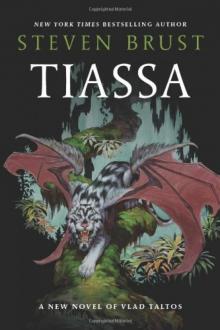 Tiassa
Tiassa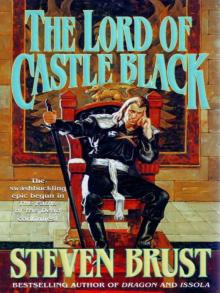 The Lord of Castle Black
The Lord of Castle Black To Reign in Hell: A Novel
To Reign in Hell: A Novel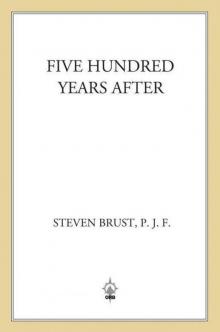 Five Hundred Years After (Phoenix Guards)
Five Hundred Years After (Phoenix Guards)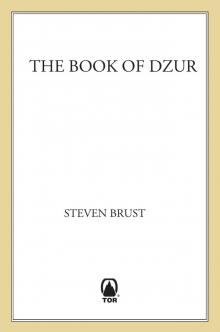 The Book of Dzur: Dzur ; Jhegaala
The Book of Dzur: Dzur ; Jhegaala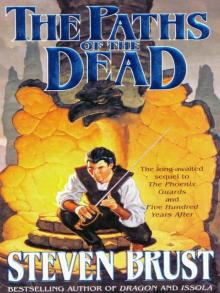 The Paths of the Dead
The Paths of the Dead Jhegaala
Jhegaala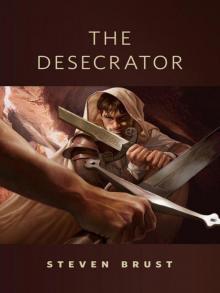 The Desecrator: A Tor.com Original
The Desecrator: A Tor.com Original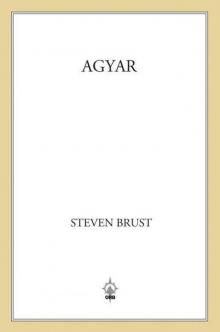 Agyar
Agyar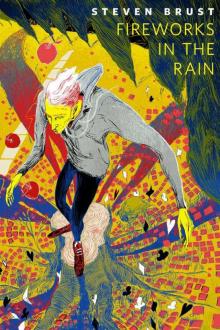 Fireworks in the Rain
Fireworks in the Rain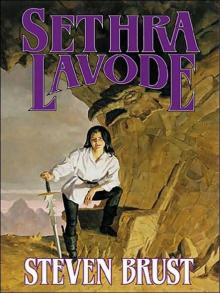 Sethra Lavode
Sethra Lavode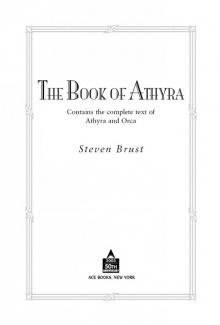 The Book of Athyra
The Book of Athyra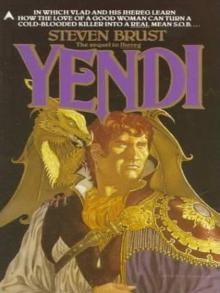 Yendi
Yendi Good Guys
Good Guys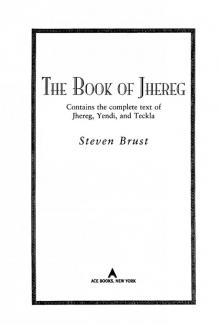 The Book of Jhereg
The Book of Jhereg Cowboy Feng's Space Bar and Grille
Cowboy Feng's Space Bar and Grille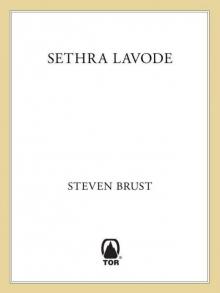 Sethra Lavode (Viscount of Adrilankha)
Sethra Lavode (Viscount of Adrilankha) My Own Kind of Freedom
My Own Kind of Freedom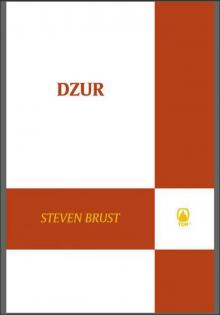 Dzur (Vlad Taltos)
Dzur (Vlad Taltos) The Lord of Castle Black: Book Two of the Viscount of Adrilankha
The Lord of Castle Black: Book Two of the Viscount of Adrilankha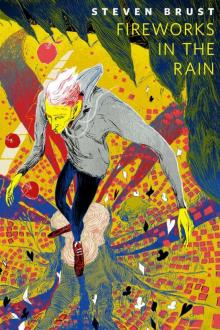 Fireworks in the Rain: A Tor.Com Original
Fireworks in the Rain: A Tor.Com Original To Reign In Hell
To Reign In Hell Issola
Issola Orca
Orca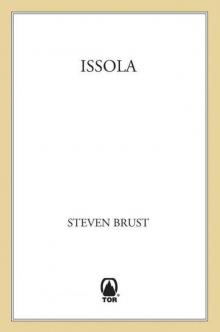 Issola (Vlad Taltos)
Issola (Vlad Taltos)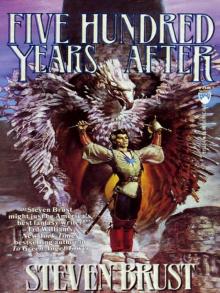 Five Hundred Years After
Five Hundred Years After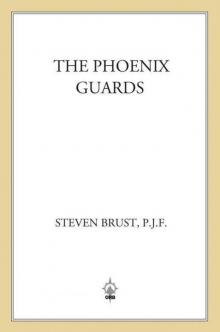 The Phoenix Guards
The Phoenix Guards Taltos
Taltos![[Vlad Taltos 06] Athyra Read online](http://i1.bookreadfree.com/i1/03/24/[vlad_taltos_06]_athyra_preview.jpg) [Vlad Taltos 06] Athyra
[Vlad Taltos 06] Athyra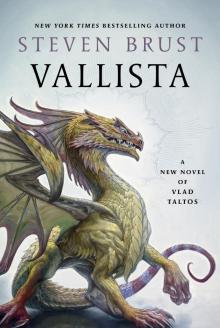 Vallista--A Novel of Vlad Taltos
Vallista--A Novel of Vlad Taltos The Incrementalists
The Incrementalists![[Vlad Taltos 04] Taltos Read online](http://i1.bookreadfree.com/i/03/24/[vlad_taltos_04]_taltos_preview.jpg) [Vlad Taltos 04] Taltos
[Vlad Taltos 04] Taltos![[Vlad Taltos 03] Teckla (v 1.1) Read online](http://i1.bookreadfree.com/i1/03/27/[vlad_taltos_03]_teckla_v_1_1_preview.jpg) [Vlad Taltos 03] Teckla (v 1.1)
[Vlad Taltos 03] Teckla (v 1.1) The Book of Taltos
The Book of Taltos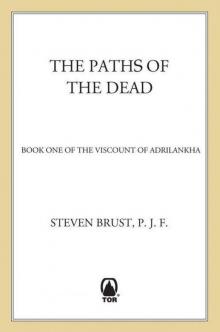 The Paths of the Dead (Viscount of Adrilankha)
The Paths of the Dead (Viscount of Adrilankha) Jhegaala (Vlad Taltos)
Jhegaala (Vlad Taltos)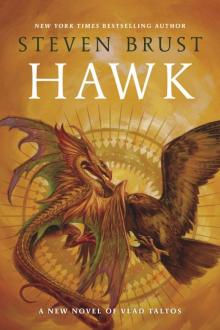 Hawk (Vlad)
Hawk (Vlad)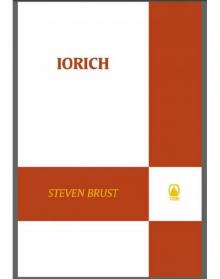 Iorich
Iorich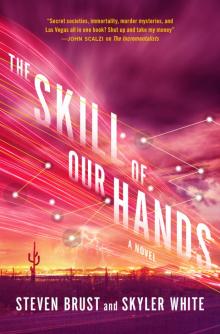 The Skill of Our Hands--A Novel
The Skill of Our Hands--A Novel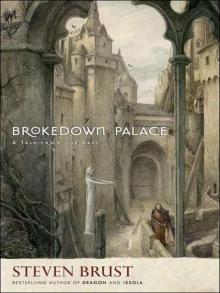 Brokedown Palace
Brokedown Palace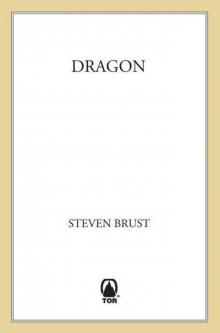 Dragon (Vlad Taltos)
Dragon (Vlad Taltos) Dragon
Dragon Athyra
Athyra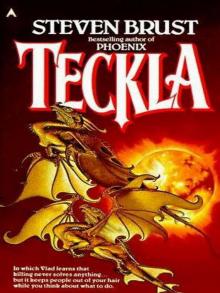 Teckla
Teckla Dzur
Dzur